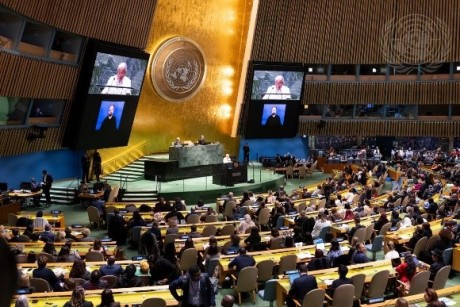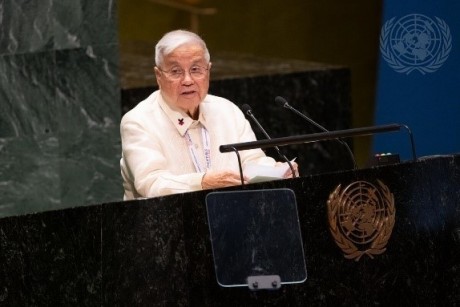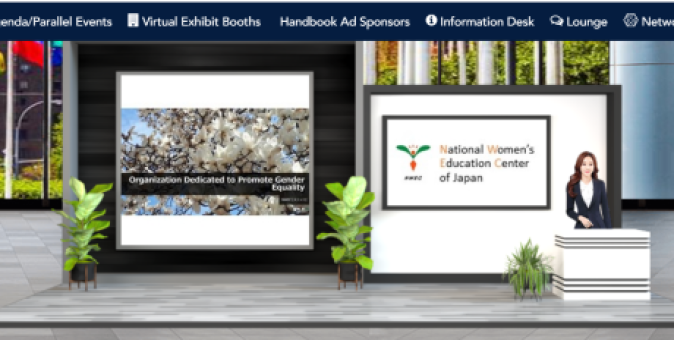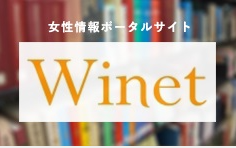International Conference/International Exchange
- HOME
- International Cooperation
- International Conference/International Exchange
- The 68th Session of the Commission on the Status of Women
International Conference/International Exchange
- CSW
-
The 68th Session of the Commission on the Status of Women
Date: March 11 to 21, 2024
The sixty-eighth Session of the Commission on the Status of Women (CSW) was held from March 11, to 22, 2024.
Overview of CSW68
The sixty-eighth Session of the Commission on the Status of Women was held at United Nations Headquarters in New York. It brought together world leaders, including 2 Heads of State, 3 Vice-Presidents, over 100 ministers, and 4,800 representatives of civil society organizations. It was the second largest CSW meeting ever held. Centered on the priority theme "Accelerating the achievement of gender equality and empowerment of all women and girls by addressing poverty and strengthening institutions and financing with a gender perspective" and the review theme "Social protection systems, access to public services and sustainable infrastructure for gender equality and the empowerment of women and girls (CSW63 Agreed Conclusions)," the meeting included ministerial roundtables, interactive dialogues, and interactive expert panels.
The priority themes discussed during the session included mobilizing and raising funds to achieve the SDGs, recognizing unpaid care work as essential work for the economy, addressing poverty and gender equality by ensuring equality in the labor market and fair compensation, intersectionality, and building systems for gender-disaggregated data collection. The interactive panels also focused on issues of access to new technologies, including AI, and the challenges arising from the technology itself. As in the previous session, an interactive panel with youth was incorporated into the plenary session, and youth representatives from Japan delivered a statement.

Opening Ceremony at UN Headquarters
(Photo: UN Photo/Manuel Elías)

CSW68 Chair
H.E. Mr. Antonio Manuel Revilla Lagdameo (Philippines)
(Photo: UN Photo/Manuel Elías)
Statements form the government of Japan
During the general debate on March 13th, Ms. KATO Ayuko, Minister in Charge of Women’s Empowerment and Minister of State for Gender Equality, made a statement in the form of a video message regarding Japan's efforts on priority themes. In the statement, Minister Kato said that in order to address the complexly intertwined structural barriers to realizing gender equality, it is necessary to adopt multifaceted approaches, including the women’s economic empowerment. The Government of Japan's efforts included setting a target for the ration of female executives for Tokyo Stock Exchange Prime listed companies to at least 30% by 2030 based on the "The Basic Policy on Gender Equality and Empowerment of Women 2023," the recommendation of formulation of an action plan to achieve the target, strengthening economic empowerment initiatives including labor mobility into digital and other growing sectors, support for women in acquiring digital skills, and support for the initiatives of the local governments to foster women entrepreneurs through grants.
In addition, at the Ministerial Roundtable Meeting (on March 13th), Ms. Asako Osaki, the representative of Japan, introduced the Government of Japan's efforts to address women's poverty, including the obligation of disclosure of employee’s Gender Pay Gap, which is imposed on employers with over 300 workers, and “Act on Supporting for Women Facing Difficulties”, as well as “Women Entrepreneurs Financing Initiative (We-Fi), which Japan has expressed its support as an international cooperation.
At the Interactive Panel with Youth (on March 14th), Ms. Riyuka Suzuki, the representative of Japan (Youth), pointed out that minorities, including women and sexual minorities, are not represented at the political and decision-making levels in Japan, and emphasized the importance of minority empowerment, including economic support, and representation at the decision-making level.
At the interactive dialogue (on March 21st), the participants exchanged views on the safe and equitable use of AI, given that AI is likely to be used as a tool of violence against women and girls, including sexual exploitation and invasion of privacy.
On March 15th, a side event entitled "Women's Multidimensional Poverty Challenges and Grassroots Responses: Insights from Japan, Sri Lanka, and Guatemala" was held, which was co-hosted by the Permanent Mission of Japan to the United Nations and three Japanese women's organizations ((JAWW) Japan Women's Watch, the National Women’s Committee of the United Nations NGOs, and the International Women's Year Liaison Group (IWYLG)).
Review Themes
The CSW reviews past CSW agendas and assess their progress. This year, a progress report and a question-and-answer session were held on the "Social protection systems, access to public services and sustainable infrastructure for gender equality and the empowerment of the girl child" which was compiled as the CSW63 Agreed Conclusions. According to the UN Secretary-General's report, the implementation of various measures to empower women and girls, including social protection systems and public services, has been confirmed in member countries over the past 5 years. On the other hand, implementation has been uneven among countries and regions. In particular, it was pointed out that the goals of addressing extreme poverty, food security, and access to digital technologies have not been achieved. Each country reported that the empowerment of women and girls, including indigenous people, and gender-based violence remain challenges, and that each country will advance its own efforts under public-private partnerships, such as establishing a system of gender-disaggregated data collection to support women, providing social protection and public services based on data, and providing support that attentive to the details of women and girls with various experiences.
Agreed Conclusions
At the CSW, the Economic and Social Council has mandated that the results of discussions on the theme of the year be compiled into agreed conclusions. The agreed conclusions was adopted on the 22nd after lengthy discussions based on the draft agreed conclusions (zero draft).
Recognizing that women and girls have become the adjustment valves affected by crises, that greater efforts are needed to increase resources and resources to address poverty among women and girls, and that the international financial system has failed to address the crisis, the agreed conclusions called on countries to reform their mobilization of resources for gender equality, including debt relief and progressive taxation, and ensuring public resources to address the needs and rights of women and girls. It also recommended mobilizing resources from public and private funding sources, strengthening the international financial system, ensuring a gender perspective in national budgeting processes, preventing regressive taxation that disproportionately affects women and girls with low or no income, strengthening national capacities to collect and use disaggregated data on multidimensional poverty, and adopting new development strategies for sustainable economies. Recommendations also include strengthening comprehensive and gender-responsive social protection systems and increasing investment in the care economy to reduce women's time and income poverty and expand employment opportunities.
The Southern African Development Community (SADC) -led resolution on HIV/AIDS was also adopted, calling for investment in gender equality and the empowerment of all women and girls in the fight against HIV/AIDS. During the CSW, a number of government representatives and civil society organizations expressed concern about the impact of digital technologies, including AI, on women and girls, particularly their economic vulnerability in times of crisis, and called for increased protection for all women and girls.
NGO CSW68 NWEC Exhibit Booth
Civil society organizations have been key drivers of the discussion to improve status of women during the CSW. This year, CSW/NY, an NGO that has supported the participation of civil society organizations in the CSW, prepared a venue inside and outside the United Nations Building and on the online platform, and held many events related to the priority themes and review themes. This year, more than 760 events were held, including parallel events organized by Japanese organizations.
The National Women's Education Center also set up an exhibition booth on the online platform to disseminate information about its efforts. At the booth, materials introducing the activities of the National Women's Education Center, including a speech by the president and a gender statistics leaflet, were posted. Virtual Open Houses were held 2 times during the session to introduce the roles and activities of the National Women's Education Center, and to network with participants.
NGO CSW68 Forum, NWEC virtual exhibit booth

International Cooperation
- International Seminar
- FY2019 Seminar for Gender Equality Officers and Women Leaders in the Asia Region
- FY2018 Seminar for Gender Equality Officers and Women Leaders in the Asia Region
- FY2017 Seminar for Gender Equality Officers and Women Leaders in the Asia Region
- FY2016 Seminar for Gender Equality Officers and Women Leaders in the Asia Region
- FY2015 Seminar for Gender Equality Officers and Women Leaders in the Asia Pacific Region
- FY2014 Seminar for Gender Equality Officers and Women Leaders in the Asia Pacific Region
- FY2013 Seminar for Gender Equality Officers and Women Leaders in the Asia Pacific Region
- FY2012 Seminar for Gender Equality Officers and Women Leaders in the Asia Pacific Region
- FY2011 Seminar for Gender Equality Officer and Women Leaders in the Asia Pacific Region
- FY2010 Empowerment Seminar for Women Leaders in the Asia Pacific Region
- FY2009 Empowerment Seminar for Women Leaders in the Asia Pacific Region Final Report
- FY2008 Empowerment Seminar for Women Leaders in the Asia Pacific Region
- FY2007 Empowerment Seminar for Women Leaders in the Asia Pacific Region
- FY2006 Empowerment Seminar for Women Leaders in the Asia Pacific Region
- NWEC Global Seminar
- FY2025 NWEC Global Seminar: Addressing Technology-Facilitated Gender Based Violence (TFGBV): Approaches to Eradicate the Invisible Harm
- FY2024 NWEC Global Seminar: Gender Equality and Care
- FY2023 NWEC Global Seminar: Gender Mainstreaming & Strengthening Institutional Mechanism with Gender Perspective
- FY2022 NWEC Global Seminar: Does Digital Technology Advance Gender Equality?
- FY2021 NWEC Global Seminar: Combating Gender-Based Violence – “Building Back Better” from the Covid-19 Crisis
- FY2020 NWEC Global Seminar: Covid-19 and Gender
- FY2019 NWEC Global Seminar: Gender and Media
- FY2018 NWEC Global Seminar: Promotion of the Advancement of Women - What Japan can learn from Iceland about Gender Equality?
- FY2017 NWEC Global Seminar: Promotion for Advancement of Women Lessons from Germany
- FY2016 NWEC Global Seminar: Promotion for Advancement of Women –Lessons from Europe
- FY2015 International Symposium: Gender Equality and Women's Empowerment
- FY2014 International Symposium: Keys to Diversity and Women's Leadership
- FY2013 NWEC International Symposium:Gender Equality for Men
- FY2012 NWEC International Symposium:To Make a Society without Violence against Women a Reality
- FY2011 NWEC International Symposium
- FY2010 International Forum for Women's Empowerment
- FY2009 International Forum for Women's Empowerment
- FY2008 International Forum for Women's Empowerment Final Report3
- FY2008 International Forum for Women's Empowerment Final Report2
- FY2008 International Forum for Women's Empowerment Final Report1
- Cooperation with JICA
- FY2025 Knowledge Co-Creation Program (KCCP): "Promotion of Global Networking on Anti-Trafficking in Persons"
- FY2025 Knowledge Co-Creation Program "Eradicating Sexual and Gender-Based Violence (SGBV)"
- FY2025 Knowledge Co-Creation Program: Bangladesh “Strengthening Capacity to Address Gender-Based Violence"
- FY2024 Knowledge Co-Creation Program on "Promotion of Global Networking on Anti-Trafficking in Persons"
- FY2024 Knowledge Co-Creation Program "Eradicating Sexual and Gender-Based Violence (SGBV)"
- FY2023 Knowledge Co-creation Program "Promotion of Networking among ASEAN Countries on Anti-Trafficking in Persons”
- FY2023 Knowledge Co-Creation Program "Eradicating Sexual and Gender-Based Violence (SGBV)"
- FY2022 Knowledge Co-creation Program "Promotion of Networking among ASEAN Countries on Anti-Trafficking in Persons”
- FY2022 Knowledge Co-Creation Program "Eradicating Sexual and Gender-Based Violence (SGBV)"
- FY2021 Knowledge Co-creation Program "Promotion of Networking among ASEAN Countries on Anti-Trafficking in Persons”
- FY2020 Knowledge Co-creation Program "Promotion of Networking among ASEAN Countries on Anti-Trafficking in Persons”
- FY2019 Knowledge Co-creation Program "Promotion of Networking among ASEAN Countries on Anti-Trafficking in Persons”
- FY2018 Knowledge Co-creation Program "Promotion of Networking among ASEAN Countries on Anti-Trafficking in Persons”
- Issue-specific Training “Seminar on Promotiom of Networking among ASEAN Countries on Anti-Trafficking in Persons”
- Basic Information-Gathering Survey/Workshop Seminar on the Economic Independence for Women in Central America and the Caribbean (El Salvador/Dominican Republic)
- Regional Gender Seminar in Central and South America
- 2015 Issue-specific Training "Seminar on Promotion of Networking among Asian Countries on Anti-Trafficking in Persons"
- Seminar on the Promotion of Education for Girls and Women II
- International Conference/International Exchange
- Online meeting with Seisen International School elementary students
- Visitor: Mansfield Fellows
- Visitor:JICA Knowledge Co-Creation Program (KCCP) on "Women's Empowerment through Business for Central American Integration System (SICA) Member Countries"
- The 68th Session of the Commission on the Status of Women
- Visitor: Madam Sustjie Mbumba, First Lady of the Republic of Namibia
- Workshop of commemorating the donation of the Beate Shirota Gordon archive materials
- Meeting with Korean Women’s Development Institute (KWDI)
- The Coalition of Finnish Women's Associations (NYTKIS) Secretary General Ms. KAKKOLA’s Courtesy Call to Foreign Minister KAMIKAWA
- The Coalition of Finnish Women's Associations (NYTKIS) Secretary General Ms. KAKKOLA’s Japan Visit Program
- The 67th Session of the Commission on the Status of Women
- NGO CSW67 Forum
- Webinar with Korean Women’s Development Institute (KWDI)
- The 66th Session of the Commission on the Status of Women (Hybrid format)
- Online meeting with international graduate students from the Appropriate Technology course at the University of Tsukuba
- The 65th session of the Commission on the Status of Women
- Lecture "The Beate Sirota Gordon Archives at Mills College"
- Participation in 2nd AGenT
- The 64th session of the Commission on the Status of Women
- Dr. Wang from National Taiwan University visits NWEC
- Japan Network of Women Engineers and Scientists and The Japan Inter-Society Liaison Association Committee for Promoting Equal Participation of Men and Women in Science and Engineering: 9th Japan Korea China Women Leaders Forum for Science & Technology
- Researcher from the KWDI visits NWEC
- Visit by a delegation from the Socialist Republic of Vietnam Ministry of National Defense
- Briefing on the Reykjavik Index for Leadership
- Women's Archives Center Exhibition "Beate Sirota Gordon and gender equality in Japanese Constitution"
- Visit from the Guangxi Women’s Federation
- Participation in the 63rd Session of the Commission on the Status of Women
- 7th Global Forum on Gender Statistics
- FY2018 International Symposium hosted by Korean Institute for Gender Equality Promotion and Education “Gender Equality at Schools”
- Visit from All-China Women’s Federation(ACWF)
- Participation in the 62nd Session of the Commission on the Status of Women
- The 14th KIGEPE International Symposium “Empowering Women’s Leadership: expanding influence and innovation”
- Participation in the 61st Session of the Commission on the Status of Women
- Visit from the Batis Center for Women
- 2011 Asia Women Eco-Science Forum (a forum of science and engineering leaders in Japan, China and Korea)
- The 60th Session of the Commission on the Status of Women
- The 59th Session of the United Nations Commission on the Status of Women
- The 58th Commission on the Status of Women
- The 57th Session of the United Nations Commission on the Status of Women
- International Symposium: Gender Awareness Education for Sustainable Development
- Thirtieth Anniversary Programs
- Attendance at the Ceremony Commemorating the 25th Anniversary of the Korean Women’s Development Institute (KWDI)
- Japanese-Filipino children (JFC)* from the Philippines-based NGO “DAWN” visit the Center
- Visitors from Abroad to NWEC
- Research report on Multicultural Family Support in South Korea
- Workshop on Gender and Education: Life-long Learning for Women’s Empowerment
- Lecture Delivered by a Visiting Researcher
- Connections: Bringing Together the Next Generation of Women Leaders in Science, Technology, Engineering and Mathematics
- Conclusion of Memorandum of Understanding on Exchange and Cooperation with the Ministry of Women's Affairs, Royal Government of Cambodia
- Visit to Japan by the Minister of Women’s Affairs of the Royal Government of Cambodia
- KIGEPE Delegation Visit
- Officials of Ministry of Information and Communications of the Socialist Republic of Vietnam visited NWEC
- The 56th Commission on the Status of Women
- Dr. Barker's visit
- Multidisciplinary Intellectual Exchange for Women Leaders from the United States, Japan, South Korea and the Philippines
- Courtesy visit to University of Hawai`i
- Delegation of Board for the Advancement of Women, Ministry of Finance of the Socialist Republic of Vietnam visited NWEC
- Visit Korean Women's Development Institute (KWDI)
- Report on Participation in the 5th World Social Forum on Migration
- A group led by the Vice President of the Korean Women's Development Institute visited NWEC
- A disaster management specialist from India visits the Center
- Visit to the Korean Institute for Gender Equality Promotion & Education (KIGEPE) and others
- Secretary of State, Ministry of Justice, Kingdom of Cambodia visited NWEC
- Research conducted in the Republic of the Philippines
- Research on the Comparative Study of the Gender Equality Policy in Southeast Asian Countries in the Kingdom of Cambodia
- Ochanomizu University and A Canadian Women’s Study Researcher visited NWEC
- Aigyung Yang, Research Fellow and Former Director of Strategy Board for Women Friendly Policies of the Korean Women's Development Institute (KWDI) Visits NWEC
- Delegation of the Ministry of Defense of the Socialist Republic of Vietnam visited NWEC
- Delegation from the Women and Development Center, of the Vietnam Women's Union, Visited NWEC
- The "7th Asia-Pacific Forum on Development and Gender" was held in Seoul, South Korea
- HOME
- International Cooperation
- International Conference/International Exchange
- International Conference/International Exchange
- The 68th Session of the Commission on the Status of Women


